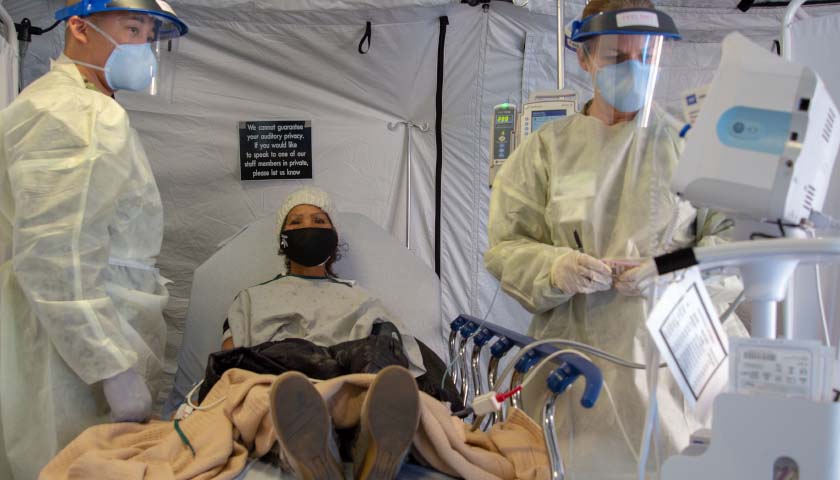by John Haughey
Florida Gov. Ron DeSantis has spent two months cross-crossing the state promoting sites and clinics that offer monoclonal antibody treatments, an increasingly popular alternative to vaccines for protection from COVID-19.
In fact, so popular that last week, the U.S. Department of Health & Human Services (DHS), while increasing overall supplies by 50%, from 100,000 to 150,000 doses a week nationwide, but capping the number of doses being delivered to Florida and six other Southern states that had previously consumed more than 70% of the nation’s monoclonal antibody treatments.
According to the Governor’s Office, state clinics and private providers had been ordering about 72,000 monoclonal antibody treatments, or doses, a week.
The Governor’s Office said about 36,000 doses are required weekly to supply the 25 clinics set up by the state and, last week alone, 90,000 doses were administered in Florida at an estimated cost of $2,100 per treatment – $189 million – paid for by the federal government.
But the DHS has rationed Florida to 30,950 doses a week, less than half its sustained consumption for more than a month. The state’s weekly allotment of Regeneron’s doses has been trimmed to 27,850 and Eli Lilly’s doses to 3,100.
Next week, DHS will further trim back Florida’s allotment to 25,692 – 17,976 Regeneron treatments and 7,716 Eli Lily doses.
DeSantis, in response, has authorized the state to purchase 3,000 monoclonal antibody treatments from GlaxoSmithKline’s (GSK) to offset the decline in federal distributions.
“Cutting the medication to Florida and other states is wrong. It’s not consistent with the promise that was made just a couple of weeks ago, and we are going to continue to fight against that,” DeSantis said Thursday, adding the state is not going to “sit on (its) rump.”
On Sept. 15, DeSantis met with GSK leadership to discuss the latest of federally-approved monoclonal antibody therapies, sotrovimab, which is what the state is purchasing from the pharmaceutical manufacturer.
“We’re going to be able to use that sotrovimab to bridge some of the gaps that are going to be developing as a result of the Biden administration dramatically cutting medications to the state of Florida,” DeSantis said.
“The fact that the Biden administration is doing this, I just think is wrong,” he continued. “The implications are going to be, I think, negative. It may mean less access. We may have to close sites. The hospitals may not have all that they need. There’s a whole host of things.”
DeSantis said trials show GSK’s sotrovimab reduces the risk of hospitalization or death in high-risk adults by 85%, making it more effective than Regeneron’s treatment.
However, because the GSK treatments cannot be inoculated, administering it takes more time than the Regeneron version, he said.
The governor said there’s no mystery why demand for monoclonal antibody treatment is so high in Florida where he has been vigorously promoting the vaccine alternative and where word-of-mouth is becoming more trusted than guidance from medical and public health professionals.
“They say, ‘Oh, well, Florida is using a lot of it,’” he said. “Yeah, because we’re pushing it out there for people. We’re not making anyone do it. We’re telling them this is here. They know it’s here. When they’re testing positive, they’re opting to do it. They’re talking to friends, they’re talking to family, and they see the results and so they’re doing it.”
– – –
John Haughey is a reporter at The Center Square.
Photo “Naval Medical Center San Diego Administers Monoclonal Antibody (mAb) Treatment to a COVID-19-Positive Patient.” by Official U.S. Navy Page. CC BY 2.0.





